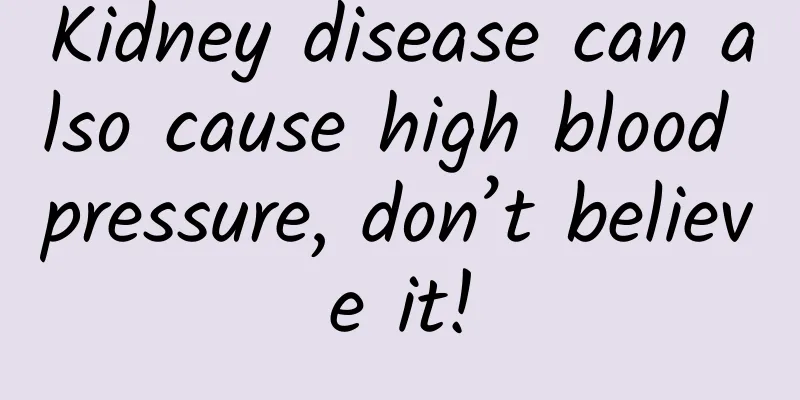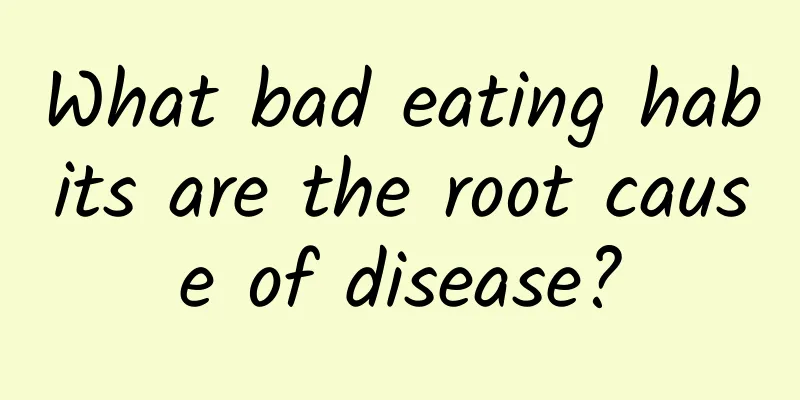Kidney disease can also cause high blood pressure, don’t believe it!

|
Author: Cai Jun, Chief Physician, Fuwai Hospital, Chinese Academy of Medical Sciences Reviewer: Wang Fang, Chief Physician, Beijing Hospital In many people's impressions, hypertension is a disease of unknown cause, but in fact, some hypertension can be found with clear causes, which we call secondary hypertension. 1. Which hypertensive patients should be considered to have secondary hypertension? Generally, patients with hypertension who develop the disease at a very young age, such as in their teens or twenties, often have secondary hypertension. Another type of situation is that a lot of medicines are used. For example, if one or two medicines are used routinely, blood pressure can be controlled very well. However, if more than two medicines are used, blood pressure is still not well controlled and is always above 140/90 mmHg. This also indicates that he may have secondary factors that seriously affect blood pressure that have not been found. There is another category, for example, clinical symptoms include fatigue, hypokalemia, foamy urine, or frequent urination at night, including a loud systolic murmur heard in the neck during clinical examination, etc. These clues indicate that these patients may have secondary hypertension. For example, the common "renal hypertension" is a common secondary hypertension. It is hypertension caused by kidney disease, such as acute or chronic glomerulonephritis, chronic pyelonephritis, kidney stones, polycystic kidney, renal artery stenosis, etc., which can cause hypertension. Why does kidney disease cause high blood pressure? The kidneys are very important excretory organs in the human body. When kidney function is impaired, many toxic substances in our body, such as urea nitrogen, creatinine, and many other products of body metabolism will be retained and accumulated in the body. These toxic substances will damage the function of the vascular endothelium and lead to blood pressure regulation disorders. In addition, when renal function is impaired, the kidneys will secrete more renin, angiotensin and aldosterone, which are hormones that increase blood pressure and can also cause high blood pressure. Another point is that because the kidneys are organs for drainage and urination, if kidney disease patients retain water and sodium, it will lead to an increase in blood volume and increase blood pressure. Of course, for hypertensive patients without kidney disease, if blood pressure rises for a long time, it will also lead to renal arteriosclerosis and renal function damage, and symptoms such as increased nocturia, proteinuria, and low back pain will appear. We call this situation hypertensive nephropathy, which is different from renal hypertension. Figure 1 Original copyright image, no permission to reprint 2. What are the characteristics of hypertension caused by kidney disease? Clinically, 70 to 80 percent of patients with renal insufficiency have hypertension, and hypertension caused by kidney disease is usually very difficult to treat. Because these patients are insensitive to many drugs, we may need to use many drugs in combination, such as calcium channel blockers such as amlodipine and nifedipine, ACEI or ARB drugs such as captopril, losartan, and valsartan, and diuretics such as hydrochlorothiazide and furosemide, etc. These drugs need to be used in combination selectively, which makes treatment more difficult. In addition, for patients with renal insufficiency, the cause of death is often not renal failure, but the secondary hypertension leading to cerebral hemorrhage or cardiovascular disease, which is the most common cause of death. Therefore, for these patients, close cooperation between cardiology and nephrology is often required, taking a two-pronged approach from blood pressure management to kidney dialysis to adjust the patient's condition together. Figure 2 Original copyright image, no permission to reprint 3. If you suspect that hypertension is caused by kidney disease, what tests do you need to do? First, we can test the urea nitrogen and creatinine in the blood, and then convert it into glomerular filtration rate (GFR) to evaluate the kidney function. Second, some components in the urine can also be tested, such as urine microalbumin, to reflect the severity of kidney damage and monitor the progression of kidney damage. In addition, for patients with reninoma, the level of renin expression should also be tested. For renal vascular hypertension such as renal artery stenosis, a very important assessment must be done, which is imaging examination. We can do renal artery angiography, which is a gold indicator for diagnosis. We can also do renal artery enhanced CT examination in the outpatient clinic. If you want to determine whether intervention or stenting is necessary for renal artery stenosis, you should also do captopril imaging. This captopril imaging is also an important indicator for evaluating whether renal artery stenosis is the cause of hypertension. If the overall result of captopril imaging is positive, it means that renal artery stenosis is the cause of hypertension. Of course, the specific examination methods to be used should be selected based on the patient's specific situation. 4. How is renal hypertension generally treated? The treatment of renal hypertension is a comprehensive treatment plan, including lifestyle adjustments, medications, surgery, etc. For example, some bad habits, such as smoking, drinking, staying up late, etc., must be changed to eliminate their impact on physical health. In terms of drug treatment, it mainly includes two points, namely antihypertensive treatment and symptomatic treatment. When choosing antihypertensive drugs, you should choose drugs that cause less damage to renal function, such as capropril, enalapril, losartan, valsartan, etc. If renal function is impaired, you can choose nifedipine, furosemide, etc. Antihypertensive drugs usually start at a low dose. If a single drug cannot bring blood pressure to the target, combined medication should be actively used. In addition, for different kidney diseases, such as pyelonephritis, kidney stones, polycystic kidney disease, renal artery stenosis, etc., corresponding medications or surgical treatments should also be actively given. |
<<: Is it dangerous to detect lung nodules? Will they develop into cancer?
>>: Medicine Baby Quiz | No more medication is needed after COPD stabilizes?
Recommend
Four tips to help you get rid of dark circles
I often see the heroine in TV dramas crying for t...
"Sometimes to heal..." in the operating room: a surgery that makes doctors helpless and painful
Dr. Zhou is an anesthesiologist at a Class II hos...
Understand echocardiogram reports and protect heart health
Author: Wan Linyuan, deputy chief physician of Fu...
What causes fallopian tube blockage? These conditions are the culprits
Fallopian tube blockage is the most common cause ...
What should I do if I feel abdominal discomfort during menstruation?
Nowadays, more than half of women will feel sligh...
Is it painful for women to have their first time?
We all know that when a man and a woman have sex ...
Will breasts get smaller after weaning?
After weaning, women need to take care of their b...
What causes women’s belly bloating?
There are many reasons that cause abdominal bloat...
These daily necessities are quietly damaging the lungs, but many people still use them every day!
Today I have to talk to you about those daily nec...
Does the change from strong positive to weak positive mean ovulation? Let you know the truth
Many people want to know about the time of female...
Left side chest pain under armpit
The armpit area is quite special. Under normal ci...
How to massage breast lumps?
If you have a breast lump, you must learn how to ...
How to determine menopause
With the increase of age, the ovaries go from uns...









